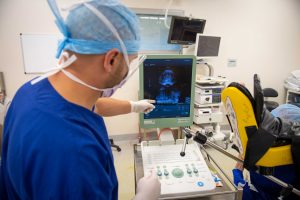What is PSA screening?
PSA screening is a test that measures the amount of prostate-specific antigen (PSA) in the blood. PSA is a protein that is produced by normal, as well as by malignant cells in the prostate. The PSA blood test is not a specific cancer test, but rather a prostate test. All men who still have their prostate will have a level of PSA detectable in their blood. In men with prostate cancer, the PSA will be higher than in those without cancer.
PSA screening is important, because prostate cancer rarely causes any symptoms until it reaches an advanced and often incurable stage.
PSA screening forms a part of the screening process for prostate cancer in men.
What is prostate cancer?
Prostate cancer is a major health concern for Australian men. Most men who are diagnosed with prostate cancer won’t die from the condition, however prostate cancer is the cause of the second highest number of cancer-related deaths in Australian men.
The prostate is a walnut-sized gland that sits just below the bladder in men. Its function is to produce the seminal fluid. Prostate cancer occurs when the cells of the prostate gland grow abnormally and unregulated. There are different types of prostate cancer. Some types of prostate cancers grow slowly, never causing the patient any harm, whilst others can spread to other parts of the body (metastasize), causing serious harm to the patient, and sometimes even death.
Is PSA screening necessary for all men?
PSA screening has been scientifically proven to save lives. A large-scale European study of over 160,000 participants demonstrated that PSA screening lead to a 20% reduction in death from prostate cancer in men who were screened.
There is unfortunately still some ongoing controversy around the PSA screening test. This has led to confusion amongst patients and their family doctors. Largely, this is due to the fact that PSA screening has the potential to detect low-grade tumours that do not generally require treatment. In some patients, this can cause anxiety. The role of a good urologist is to manage the patient appropriately to avoid over-treatment, which is particularly important in such cases.

PSA screening remains an effective way to diagnose high-grade prostate cancers at an early stage, so that they can be treated in a timely manner, giving the patient the best chance of cure.
Who should undergo PSA screening?
Deciding whether or not to have a PSA screening test is a personal choice. The benefit of undergoing PSA screening are early detection of prostate cancer, with improved chances of early treatment and cure. The proposed disadvantage is that over-detection of low-grade cancers not requiring treatment can lead to patient anxiety.
Men who are interested to learn their individual risk of having or of developing prostate cancer can speak to their family doctor about undergoing PSA screening.
Generally, the recommendation for PSA screening for men is:
- At 50 years of age, if there is no family history of prostate cancer
- At 45 years of age if there is a first degree relative (father, uncle or brother) with prostate cancer.
How is a PSA screening conducted?
PSA screening involves the collection of a blood sample from the patient. This is sent to the laboratory for analysis. Results are generally reported as nanograms of PSA per millilitre (ng/mL) of blood.
It is important to understand that there is no ‘normal’ level of PSA. PSA will be detectable in the blood of all men who still have their prostate. Other conditions (such as an enlarged prostate (BPH), inflammation (prostatitis) or infection) can also cause the PSA level to be elevated.
It is for this reason that the PSA level only forms part of the screening process for prostate cancer, and highlights the importance of monitoring PSA levels over time, rather than considering only a single reading.
What happens if the PSA is elevated on the PSA screening test?
If your reading on the PSA screening test is elevated, generally you will be asked to return for a repeat test in 4-6 weeks, to determine whether that was a true reading. From there, your urologist will perform a comprehensive assessment to determine your individual risk. They may recommend further investigation with a multiparametric MRI and transperineal prostate fusion biopsy. This can definitively diagnose or exclude prostate cancer. If you are diagnosed with prostate cancer, then your urologist will ensure that you are fully informed of your options for management, including active surveillance in cases of low-grade, low-risk cancers, to avoid over-treatment.
